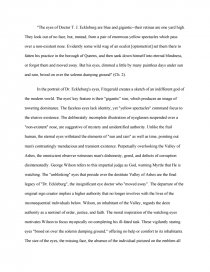Doctor Eckleburg
Essay by review • December 29, 2010 • Essay • 344 Words (2 Pages) • 1,326 Views
"The eyes of Doctor T. J. Eckleburg are blue and gigantic--their retinas are one yard high. They look out of no face, but, instead, from a pair of enormous yellow spectacles which pass over a non-existent nose. Evidently some wild wag of an oculist [optometrist] set them there to fatten his practice in the borough of Queens, and then sank down himself into eternal blindness, or forgot them and moved away. But his eyes, dimmed a little by many paintless days under sun and rain, brood on over the solemn dumping ground" (Ch. 2).
In the portrait of Dr. Eckleburg's eyes, Fitzgerald creates a sketch of an indifferent god of the modern world. The eyes' key feature is their "gigantic" size, which produces an image of towering dominance. The faceless eyes lack identity, yet "yellow spectacles" command focus to the elusive existence. The deliberately incomplete illustration of eyeglasses suspended over a "non-existent" nose, are suggestive of mystery and unidentified authority. Unlike the frail human, the eternal eyes withstand the elements of "sun and rain" as well as time, pointing out man's contrastingly mendacious and transient existence. Perpetually overlooking the Valley of Ashes, the omniscient observer witnesses man's dishonesty, greed, and defects of corruption disinterestedly. George Wilson refers to this impartial judge as God, warning Myrtle that He is watching. The "unblinking" eyes that preside over the destitute Valley of Ashes are the final legacy of "Dr. Eckleburg", the insignificant eye doctor who "moved away". The departure of the original sign creator implies a higher authority that no longer involves with the lives of the inconsequential individuals below. Wilson, an inhabitant of the Valley, regards the deist authority as a sentinel of order, justice, and faith. The moral inspiration of the watching eyes motivates Wilson to focus myopically on completing his ill-fated task. These vigilantly staring eyes "brood on over the solemn dumping ground," offering no help or comfort to its inhabitants. The size of the eyes, the missing face, the absence of the individual pictured on the emblem all suggests an apathetic superior being.
...
...

